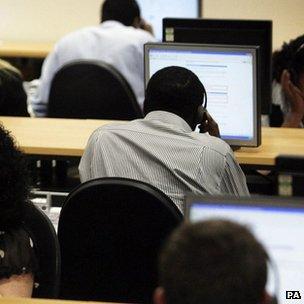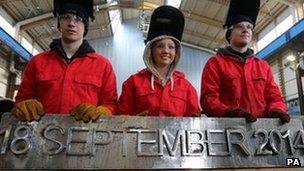In search of certainty
- Published

Businesses say they need more information on the debate about Scotland's future
We may be fairly sure, all things being equal, of death and taxation. Other than that, the uncertainty principle which permeates the core of matter itself may be said to predominate.
Yet still we seek certainty. Indeed, our relatively brief sojourn through this earthly existence may be seen as a search for assurance. From the moment, as infants, we cleave to our adult carers, we are seeking solace, striving to minimise anxiety.
So it is entirely reasonable that Scotland's business community should be seeking more information, on two fronts, from our elected politicians.
Firstly, they want to know what will be the taxation to be levied on property and land deals when the Scottish Parliament gains power over such matters from April 2015.
At Holyrood, the Conservatives are today urging Ministers to give at least a year's notice of the bands and rates which will apply when Holyrood takes charge.
On the wireless this morning, John Swinney sought to dispel some of the uncertainty by stating that he would publish such information in conjunction with his Budget for that year which will be published in September 2014.
But of course there is another political event that month - which is the subject of the second bout of disquiet in the business sector.
A survey by Scottish Chambers of Commerce suggests that 58% of member firms who responded do not yet have sufficient information upon which to base their eventual decision in the referendum choice.
One sympathises, one understands. It tends to confirm what we already knew: that the Yes Scotland campaign and the Scottish Government have a job to do if they are to provide sufficient reassurance.
Meanwhile, it will be the primary objective of the other side - Better Together, the UK Government - to inculcate and enhance doubt while, they would insist, also setting out what they believe to be the positive case for the Union.
One problem for the Yes side is that part of their offer is conditional upon post-referendum negotiations and discussions. And, to a large extent, those talks would involve some of their present opponents in the referendum.
So, for example, Scottish Government Ministers say that an independent Scotland would use sterling; not unilaterally but as part of a currency zone.
However, the Chancellor says it is not certain that the Bank of England or the UK Treasury would be content with such an arrangement. To which Scottish Government Ministers reply that it would be in the interests of the remainder of the UK, rUK, to form a currency zone with an agreed stability pact - on the premise that Scotland could use sterling unilaterally anyway.
They are arguing, in essence, that the UK monetary authorities will have one position, pre-independence, which is to foster doubt - and another post-independence which would be to sustain as much stability as possible in the face of the newly emerged position.
Alternative scenarios
Now, it does not seem likely that issue can be cleared up entirely, in advance of September 2014.
There cannot be absolute certainty for as long as the UK Government persists in raising doubts.
Entirely understandably, from their perspective, the Scottish Government urges pre-referendum negotiations now in order to provide the clarity which business apparently seeks.

Scotland's referendum takes place in September next year
Entirely understandably, from their very different perspective, the UK Government distances itself from such negotiations, arguing that they do not believe the people of Scotland will opt for independence.
Absolute certainty in such circumstances is, therefore, difficult to envisage. At best, it will be a question of providing alternative scenarios - and inviting the voters, including business, to choose.
There is a more fundamental point. One understands the search for certainty. It is entirely reasonable from a business perspective to seek to minimise doubt.
But remember that independence would be implemented, at the earliest, from 2016 in the event of a Yes vote.
Business wants certainty about the economic circumstances which might prevail then. But could the Chancellor of the Exchequer tell them what the economy will be like in 2016? When it includes a wide range of factors? What will the oil price be? Will the UK be in or heading out of the EU by then? What about the Middle East? The global trading pattern?
One can forecast. One can predict. One can analyse. And, as this referendum campaign proceeds, there will be data aplenty.
More papers from the UK Government. More from the Scottish Government, leading to the independence White Paper itself in November this year.
But that data will, inevitably, be accompanied by competing analyses, rival verdicts. Simple certainty? Not in this life.